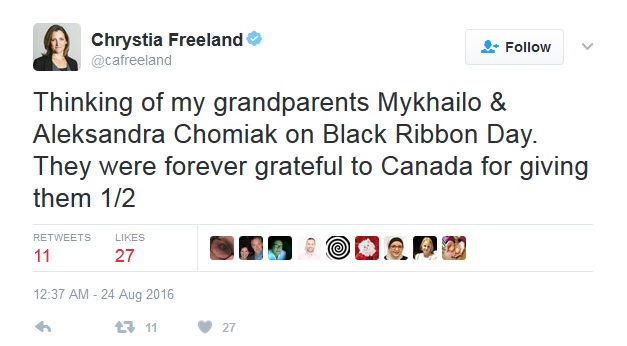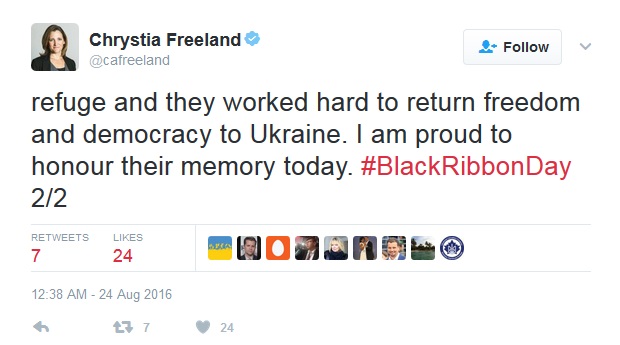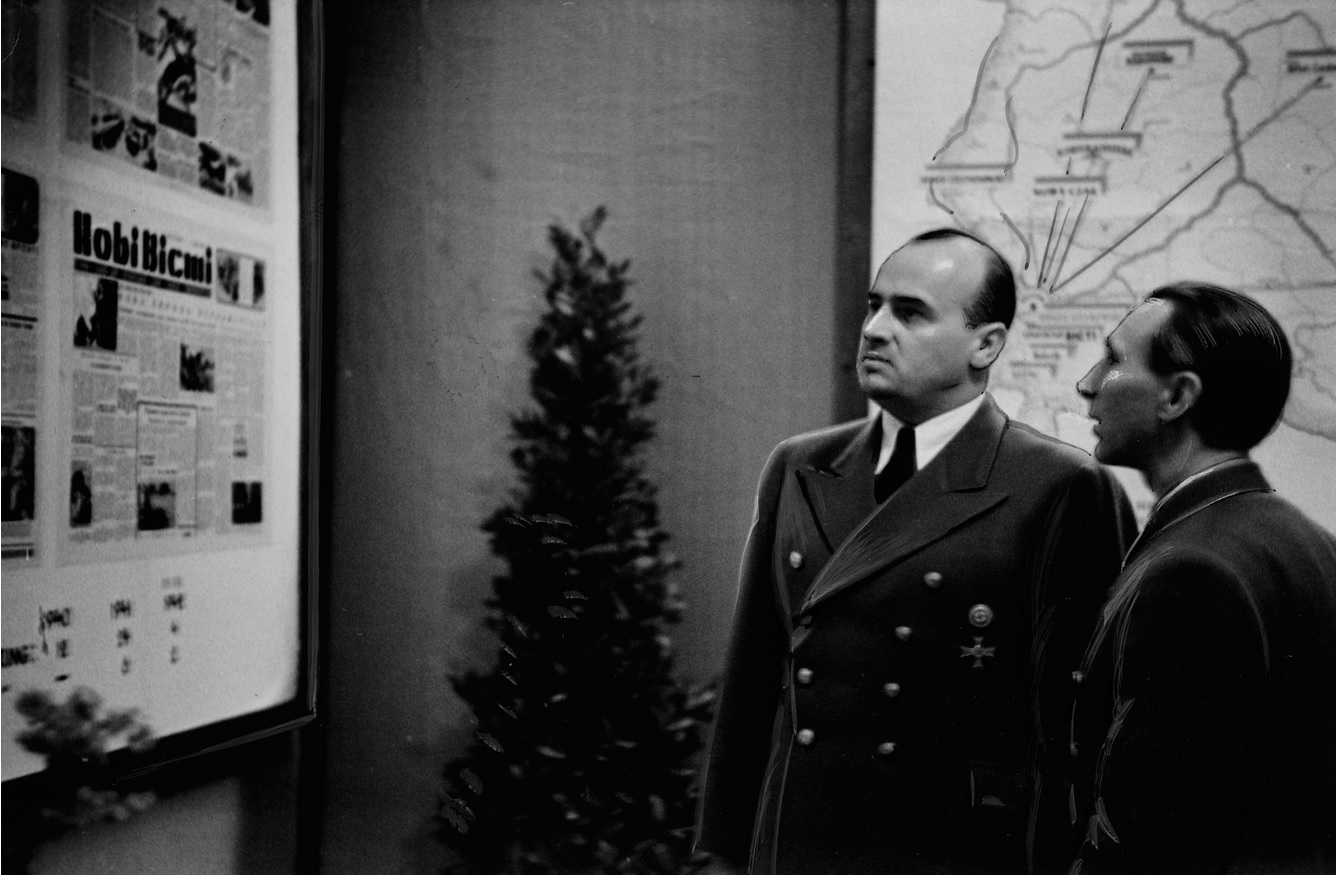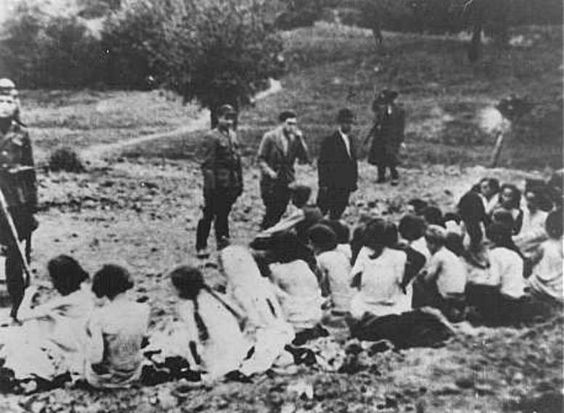Arina TSUKANOVA
On Jan. 10, Canadian Prime Minister Justin Trudeau replaced Foreign Minister Stephane Dion with Chrystia Freeland, a former journalist proud of her Ukrainian roots and well-known for her hostility toward Russia. At the time, a big question in Ottawa was why. Some analysts believed that Trudeau’s decision may have started when it still seemed likely that Hillary Clinton would become the new U.S. president and a tough line against Moscow was expected in Washington.
However, by the time the switch was made, Donald Trump was on his way into the White House and Trudeau’s choice meant that Canada was allying itself more with the mounting hostility toward Russia inside the European Union than with President Trump’s hopes for a more cooperative relationship with the Kremlin. With Freeland running Canada’s Foreign Ministry, the chance for a shared view between Ottawa and Washington suddenly seemed remote.
People who have followed Freeland’s career were aware that her idée fixe for decades has been that Ukraine must be ripped out of the Russian sphere of influence. Her views fit with the intense Ukrainian nationalism of her maternal grandparents who immigrated to Canada after World War II and whom she has portrayed as victims of Josef Stalin and the Red Army.
So, Freeland celebrated the Soviet collapse in 1991, which enabled Ukraine to gain its independence. Freeland, then in her early 20s, was working in Kiev as a stringer for The Financial Times and The Washington Post, shining with delight over the emergence of a “New Ukraine.”
By the next decade, working as the U.S. managing editor of The Financial Times, she proudly interviewed then-Ukrainian President Viktor Yushchenko, who had won control as a result of the 2004 “Orange Revolution.” In her approach to journalism, Freeland made clear her commitment to foment Ukrainian-Russian tensions in any possible way. Indeed, during her journalistic career, which ended in 2013 when she won a seat in Canada’s parliament, Freeland remained fiercely anti-Russian.
In 2014, Yushchenko’s rival Viktor Yanukovych was Ukraine’s elected president while Canadian MP Freeland urged on the “Euro-Maidan” protests against Yanukovych and his desire to maintain friendly relations with Moscow. On Jan. 27, 2014, as the protests grew more violent with ultra-nationalist street fighters moving to the forefront and firebombing police, Freeland visited Kiev and published an op-ed in The Globe and Mail blaming the violence on Yanukovych.
“Democratic values are rarely challenged as directly as they are being today in Ukraine,” Freeland wrote, arguing that the protesters, not the elected president, represented democracy and the rule of law. “Their victory will be a victory for us all; their defeat will weaken democracy far from the Euromaidan. We are all Ukrainians now. Let’s do what we can — which is a lot — to support them.”
Ukraine’s ‘Regime Change’
Freeland’s op-ed appeared at about the same time as her ideological ally, U.S. Assistant Secretary of State Victoria Nuland, was caught on an insecure phone line discussing with U.S. Ambassador to Ukraine Geoffrey Pyatt who the new leaders of Ukraine should be. “Yats is the guy,” Nuland said about Arseniy Yatsenyuk while dismissing the E.U.’s less aggressive approach to the crisis with the pithy remark, “Fuck the E.U.” Nuland and Pyatt then pondered how to “glue this thing” and “midwife this thing.”
Several weeks later, on Feb. 20, a mysterious sniper shot both police and protesters, touching off a day of bloody mayhem. On Feb. 22, armed rioters seized government buildings and forced Yanukovych to flee for his life. He was then impeached without the constitutional rules being followed. Yatsenyuk became prime minister, and Western governments quickly pronounced the new regime “legitimate.”
The new xenophobic regime in Kiev – bristling with hostility toward ethnic Russian Ukrainians – did not embarrass Freeland. As Canada’s newly appointed minister of international trade, Freeland met frequently with Ukrainian officials, more so than with many of Canada’s leading trade partners.
But the more troubling question is whether Freeland’s devotion to Ukrainian nationalism is rooted not in her commitment to the “rule of law” or “democratic values” or even the well-being of the Ukrainian people whose living standards have declined sharply since the Feb. 22, 2014 putsch (amid continued government corruption), but in her devotion to her Ukrainian grandparents whom she still views as victims of Stalin and the Red Army.
Last Aug. 24, reflecting on so-called Black Ribbon Day, which lumps together the crimes of Josef Stalin and Adolf Hitler (with Stalin getting top billing), she wrote on Twitter, “Thinking of my grandparents Mykhailo & Aleksandra Chomiak on Black Ribbon Day. They were forever grateful to Canada for giving them refuge and they worked hard to return freedom and democracy to Ukraine. I am proud to honour their memory today.”

In her autobiography, Freeland presents her grandparents in the following way: “My maternal grandparents fled western Ukraine after Hitler and Stalin signed their non-aggression pact in 1939. They never dared to go back, but they stayed in close touch with their brothers and sisters and their families, who remained behind.”

According to Freeland, her grandfather Mykhailo Chomiak was “a lawyer and journalist before the Second World War, but they [her grandparents] knew the Soviets would invade western Ukraine (and) fled.” After the war, her mother was born in a refugee camp in Germany before the family immigrated to western Canada, Freeland wrote.
Freeland’s grandfather was allegedly able to get a visa only thanks to his sister who had crossed the ocean before the war. The family story told by Freeland portrays her grandparents as World War II victims, but that is not the real or full story.
Chrystia Freeland’s dark family secret is that her grandfather, Mykhailo Chomiak, faithfully served Nazi Germany right up to its surrender, and Chomiak’s family only moved to Canada after the Third Reich was defeated by the Soviet Union’s Red Army and its allies – the U.S. and Great Britain.
Mykhailo Chomiak was not a victim of the war – he was on the side of the German aggressors who collaborated with Ukrainian nationalists in killing Russians, Jews, Poles and other minorities. Former journalist Freeland chose to whitewash her family history to leave out her grandfather’s service to Adolf Hitler. Of course, if she had told the truth, she might never have achieved a successful political career in Canada. Her fierce hostility toward Russia also might be viewed in a different light.

Michael Chomiak and wife Alexandra, with their children in Canada in 1952. Freeland’s mother Halyna is second from left
Freeland’s Grandfather
According to Canadian sources, Chomiak graduated from Lviv University in western Ukraine with a Master’s Degree in Law and Political Science. He began a career with the Galician newspaper Dilo (Action), published in Lviv. After the start of World War II, the Nazi administration appointed Chomiak to be editor of the newspaper Krakivski Visti (News of Krakow).
So the truth appears to be that Chomiak moved from Ukraine to Nazi-occupied Poland in order to work for the Third Reich under the command of Governor-General Hans Frank, the man who organized the Holocaust in Poland. Chomiak’s work was directly supervised by Emil Gassner, the head of the press department in the Polish General Government.

Governor Hans Frank (left) and Emil Gassner open the German Press House in Krakow, March 1942
Mikhailo Chomiak comfortably settled his family into a former Jewish (or Aryanized) apartment in Krakow. The editorial offices for Krakivski Visti also were taken from a Jewish owner, Krakow’s Polish-language Jewish newspaper Nowy Dziennik. Its editor at the time was forced to flee Krakow for Lviv, where he was captured following the occupation of Galicia and sent to the Belzec extermination camp, where he was murdered along with 600,000 other Jews.
So, it appears Freeland’s grandfather – rather than being a helpless victim – was given a prestigious job to spread Nazi propaganda, praising Hitler from a publishing house stolen from Jews and given to Ukrainians who shared the values of Nazism.
On April 24, 1940, Krakivski Visti published a full-page panegyric to Adolf Hitler dedicated to his 51st birthday (four days earlier). Chomiak also hailed Governor-General Hans Frank: “The Ukrainian population were overjoyed to see the establishment of fair German authority, the bearer of which is you, Sir Governor-General. The Ukrainian people expressed this joy not only through the flowers they threw to the German troops entering the region, but also through the sacrifices of blood required to fight Polish usurpers.” (Because of Frank’s role in the Holocaust, the Nuremberg Tribunal found him guilty of crimes against humanity and executed him.)
Beyond extolling Hitler and his henchmen, Chomiak rejoiced over Nazi military victories, including the terror bombings of Great Britain. While praising the Third Reich, Krakivski Visti was also under orders by the German authorities to stir up hatred against the Jewish population. Editorial selections from Chomiak’s newspaper can be found in Holocaust museums around the world, such as the one in Los Angeles, California.
The Nov. 6, 1941 issue of Krakivski Visti ecstatically describes how much better Kiev is without Jews. “There is not a single one left in Kiev today, while there were 350,000 under the Bolsheviks,” the newspaper wrote, gloating that the Jews “got their comeuppance.”
That “comeuppance” refers to the mass shooting of Kiev’s Jewish population at Babi Yar. In just two days, Sept. 29-30, 1941, a total of 33,771 people were murdered, a figure that does not include children younger than three years old. There were more shootings in October, and by early November, Krakivski Visti was enthusing over a city where the Jewish population had “disappeared” making Kiev “beautiful, glorious.” Chomiak’s editorials also described a Poland “iinfected by Jews.”

Jewish women lined up waiting to be shot at Babi Yar, September 1941
According to John-Paul Himka, a Canadian historian of Ukrainian origin, Krakivski Visti stirred up emotions against Jews, creating an atmosphere conducive to mass murder. In 2008, the Institute of Historical Research at Lviv National University published a paper co-authored by Himka entitled “What Was the Attitude of the Organization of Ukrainian Nationalists toward the Jews?” The paper states that, by order of the German authorities, Krakivski Visti published a series of articles between June and September 1943 under the title “Yids in Ukraine” that were written in an extremely anti-Semitic and pro-Nazi vein. The Canadian historian writes that Jews were portrayed as criminals, while Ukrainians were portrayed as victims.
Refuge in Canada
As the war turned against the Nazis and the Red Army advanced across Ukraine and Poland, Nazi propagandist Emil Gassner took Mykhailo Chomiak in 1944 to Vienna where Krakivski Visti continued to publish. As the Third Reich crumbled, Chomiak left with the retreating German Army and surrendered to the Americans in Bavaria, where he was placed with his family in a special U.S. military intelligence facility in Bad Wörishofen, a cluster of hotels situated 78 kilometers from Munich in the foothills of the Alps.
The Chomiak family was given accommodations, living expenses and health care. In her biography, Freeland refers to it only as “a refugee camp.” In September 1946, Mikhailo Chomiak’s daughter Halyna was born in that spa town. In May 1948, the facility was closed and Chomiak, the former Nazi editor, departed for Canada.
While it is true that the sins of a grandfather should not be visited on his descendants, Freeland should not have misled the public on history of such importance, especially when her deceptions also concealed how she partly developed her world view. The family’s deep hostility toward Russia appears to have been passed down from Mikhailo Chomiak’s generation to his granddaughter Chrystia Freeland.
Like many of today’s Ukrainian nationalists, including pockets of post-World War II immigrants in Canada and the United States, Freeland glosses over the violent abuses of the current regime in Kiev toward ethnic Russians, including the fatal firebombing of the Trade Union Building in Odessa and enlistment of neo-Nazi militias to prosecute the so-called “Anti-Terror Operation” against ethnic Russian rebels in the Donbass region. Overall, the conflict has killed some 10,000 people, including many ethnic Russian civilians.
But Freeland only sees “Russian aggression” and vows to maintain an unrelentingly hard line to punish Moscow. So, the pressing question about Freeland is whether her family history makes her incapable of an objective assessment of this dangerous New Cold War crisis. Is a person who describes her Nazi-collaborating grandfather as someone who “worked hard to return freedom and democracy to Ukraine” fit to represent Canada to the world?









